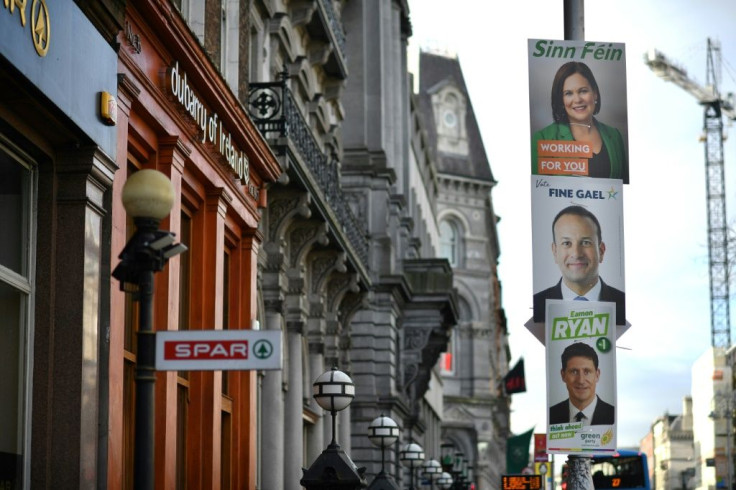Final Scramble For Votes Before Ireland Goes To The Polls
Ireland on Friday entered the final day of campaigning before this weekend's election, as polls predicted a historic three-way fight for control of the next government.
Prime Minister Leo Varadkar, of the Fine Gael party, was canvassing in the western town of Ennis while Fianna Fail leader Micheal Martin was in his home city of Cork, in the south.
But the two centre-right parties, who have had a duopoly on power for decades, were facing a stiff challenge from Sinn Fein, whose flagship policy is reuniting the republic with British-run Northern Ireland.
An Irish Times/Ipsos MRBI poll published Monday put the republicans on 25 percent, suggesting its left-wing policies to tackle a housing and healthcare crisis have popular appeal.
Fianna Fail were on 23 percent with Fine Gael on 20 percent.
Varadkar has touted his successful handling of Brexit negotiations, which eased immediate fears that a damaging split between Britain and the European Union could hurt Ireland.
Polls open at 0700 GMT on Saturday but 12 islands off Ireland's west coast began voting on Friday as a precaution against bad weather which can affect the transport of ballot boxes by boat.
The smallest -- Inishfree -- has an electorate of just four.
Varadkar was a key figure in the Brexit talks, which saw London strike a deal with Brussels without having a hard border put up between Ireland and Northern Ireland.
An open border was a key plank of the 1998 Good Friday Agreement that largely ended more than 30 years of violence over British rule in the north that killed more than 3,000 people.
But polling ranks Brexit low in public concerns and there is broad consensus among all parties on how forthcoming UK-EU trade talks should be handled.
Eoin O'Malley, of Dublin City University, called Varadkar's decision to call an election one week after Brexit a "miscalculation" as it focused attention on his party's failings.
"Because Brexit was actually happening during the election campaign, they thought that it might put it back up as an issue," he told AFP.
"But really for most people the issues are that they're spending long periods of time commuting to work and can't afford to buy a home and can barely afford to pay the rent."

The next government is widely expected to be a coalition, raising the prospect of protracted negotiations.
It took 70 days before a new minority coalition government was formed in 2016, with Fine Gael propped up by a confidence and supply arrangement with Fianna Fail.
Despite Sinn Fein's polling lead, it is only fielding 42 candidates -- not enough to form a majority government in the lower house of parliament the Dail even if all its candidates were to win.
The party, which was once the political wing of the Irish Republican Army (IRA), also historically underperforms at elections.
Fine Gael and Fianna Fail have both ruled out working with Sinn Fein because of its left-wing stance and past links to the paramilitary group.
They have also rejected Sinn Fein's calls for a referendum on Irish sovereignty to be held within five years.
Fianna Fail have also ruled out backing Fine Gael in a "grand coalition" but analysts say they could become more pragmatic as the parliamentary arithmetic becomes clearer.
O'Malley ruled out Sinn Fein entering an alliance with Fine Gael but said an uneasy coalition between Fianna Fail and the republicans could theoretically be formed.
"Fianna Fail and Fine Gael might end up in some sort of coalition together but there are lots of reasons why that would be difficult as well," he said.
Parties could struggle to come to terms or a weak government may be formed which may not last a full term, bringing another election which might allow Sinn Fein to consolidate as the main opposition.
"I'm pretty sure Sinn Fein don't want to go into government yet," said O'Malley. "I suspect what it really wants is another election relatively soon.
"And I think that may be what could happen."
© Copyright AFP 2024. All rights reserved.





















